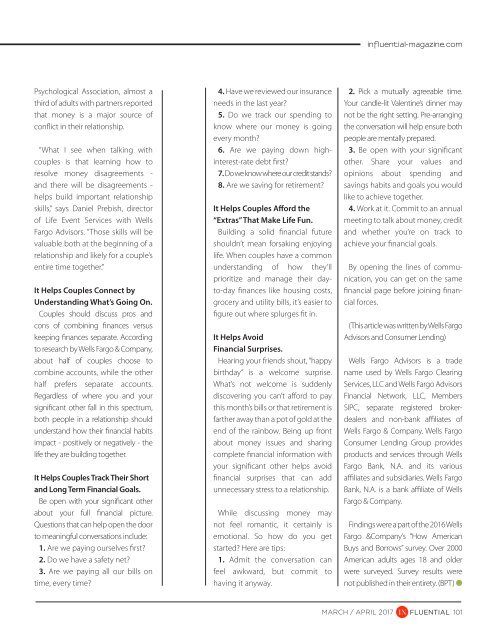InFluential_Magazine_March_April_2017
Create successful ePaper yourself
Turn your PDF publications into a flip-book with our unique Google optimized e-Paper software.
influential-magazine.com<br />
Psychological Association, almost a<br />
third of adults with partners reported<br />
that money is a major source of<br />
conflict in their relationship.<br />
“What I see when talking with<br />
couples is that learning how to<br />
resolve money disagreements -<br />
and there will be disagreements -<br />
helps build important relationship<br />
skills,” says Daniel Prebish, director<br />
of Life Event Services with Wells<br />
Fargo Advisors. “Those skills will be<br />
valuable both at the beginning of a<br />
relationship and likely for a couple’s<br />
entire time together.”<br />
It Helps Couples Connect by<br />
Understanding What’s Going On.<br />
Couples should discuss pros and<br />
cons of combining finances versus<br />
keeping finances separate. According<br />
to research by Wells Fargo & Company,<br />
about half of couples choose to<br />
combine accounts, while the other<br />
half prefers separate accounts.<br />
Regardless of where you and your<br />
significant other fall in this spectrum,<br />
both people in a relationship should<br />
understand how their financial habits<br />
impact - positively or negatively - the<br />
life they are building together.<br />
It Helps Couples Track Their Short<br />
and Long Term Financial Goals.<br />
Be open with your significant other<br />
about your full financial picture.<br />
Questions that can help open the door<br />
to meaningful conversations include:<br />
1. Are we paying ourselves first?<br />
2. Do we have a safety net?<br />
3. Are we paying all our bills on<br />
time, every time?<br />
4. Have we reviewed our insurance<br />
needs in the last year?<br />
5. Do we track our spending to<br />
know where our money is going<br />
every month?<br />
6. Are we paying down highinterest-rate<br />
debt first?<br />
7. Do we know where our credit stands?<br />
8. Are we saving for retirement?<br />
It Helps Couples Afford the<br />
“Extras” That Make Life Fun.<br />
Building a solid financial future<br />
shouldn’t mean forsaking enjoying<br />
life. When couples have a common<br />
understanding of how they’ll<br />
prioritize and manage their dayto-day<br />
finances like housing costs,<br />
grocery and utility bills, it’s easier to<br />
figure out where splurges fit in.<br />
It Helps Avoid<br />
Financial Surprises.<br />
Hearing your friends shout, “happy<br />
birthday” is a welcome surprise.<br />
What’s not welcome is suddenly<br />
discovering you can’t afford to pay<br />
this month’s bills or that retirement is<br />
farther away than a pot of gold at the<br />
end of the rainbow. Being up front<br />
about money issues and sharing<br />
complete financial information with<br />
your significant other helps avoid<br />
financial surprises that can add<br />
unnecessary stress to a relationship.<br />
While discussing money may<br />
not feel romantic, it certainly is<br />
emotional. So how do you get<br />
started? Here are tips:<br />
1. Admit the conversation can<br />
feel awkward, but commit to<br />
having it anyway.<br />
2. Pick a mutually agreeable time.<br />
Your candle-lit Valentine’s dinner may<br />
not be the right setting. Pre-arranging<br />
the conversation will help ensure both<br />
people are mentally prepared.<br />
3. Be open with your significant<br />
other. Share your values and<br />
opinions about spending and<br />
savings habits and goals you would<br />
like to achieve together.<br />
4. Work at it. Commit to an annual<br />
meeting to talk about money, credit<br />
and whether you’re on track to<br />
achieve your financial goals.<br />
By opening the lines of communication,<br />
you can get on the same<br />
financial page before joining financial<br />
forces.<br />
(This article was written by Wells Fargo<br />
Advisors and Consumer Lending)<br />
Wells Fargo Advisors is a trade<br />
name used by Wells Fargo Clearing<br />
Services, LLC and Wells Fargo Advisors<br />
Financial Network, LLC, Members<br />
SIPC, separate registered brokerdealers<br />
and non-bank affiliates of<br />
Wells Fargo & Company. Wells Fargo<br />
Consumer Lending Group provides<br />
products and services through Wells<br />
Fargo Bank, N.A. and its various<br />
affiliates and subsidiaries. Wells Fargo<br />
Bank, N.A. is a bank affiliate of Wells<br />
Fargo & Company.<br />
Findings were a part of the 2016 Wells<br />
Fargo &Company’s “How American<br />
Buys and Borrows” survey. Over 2000<br />
American adults ages 18 and older<br />
were surveyed. Survey results were<br />
not published in their entirety. (BPT) l<br />
MARCH / APRIL <strong>2017</strong><br />
FLUENTIAL<br />
101


















